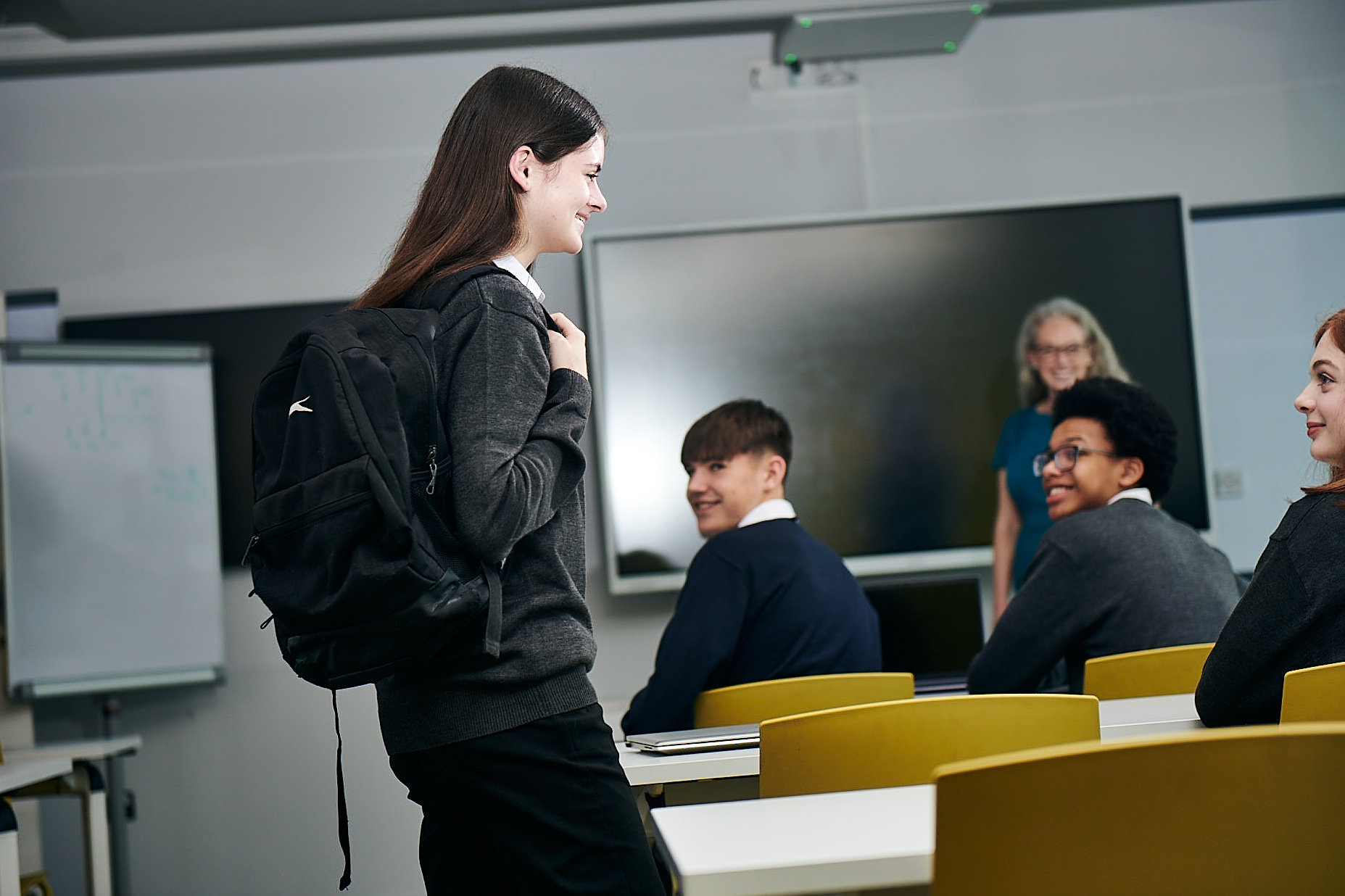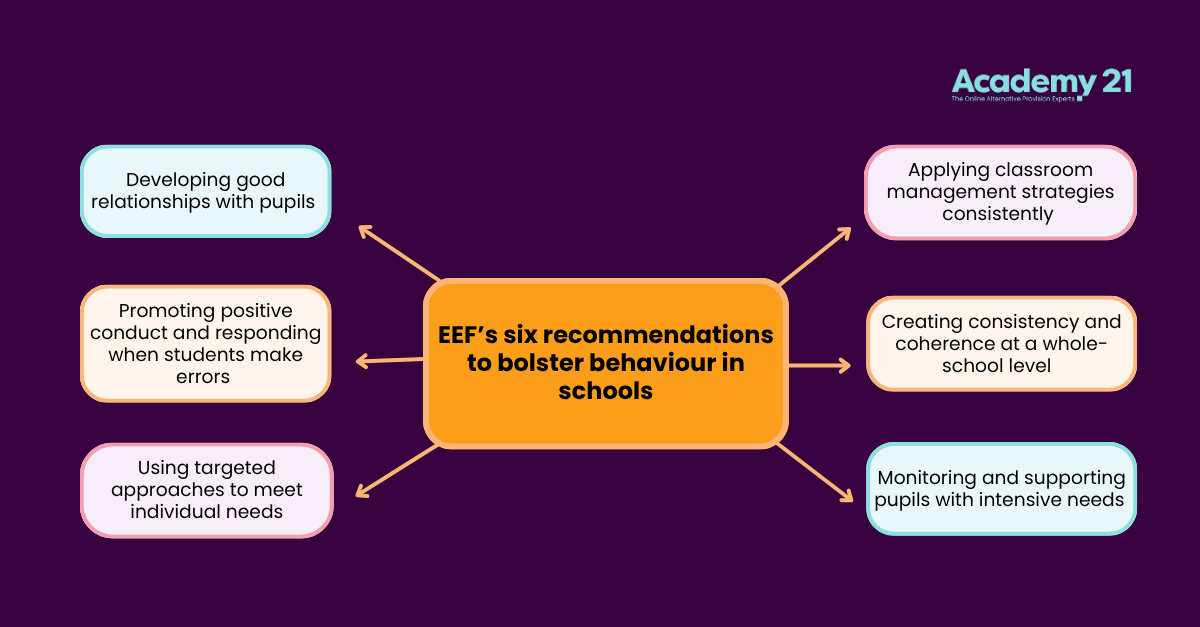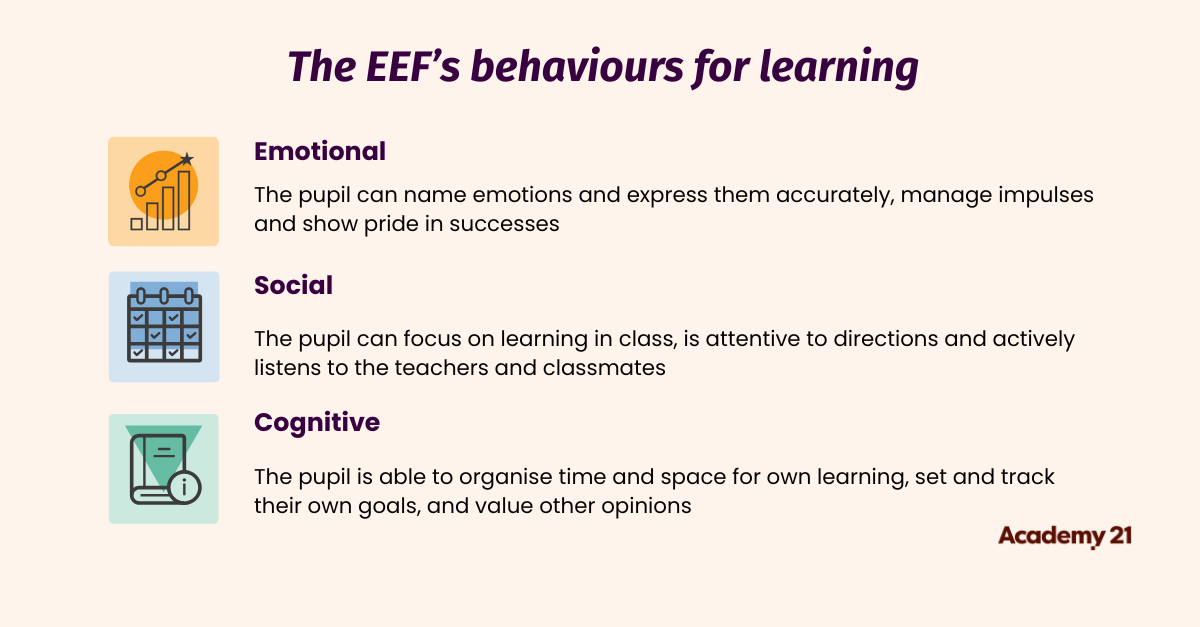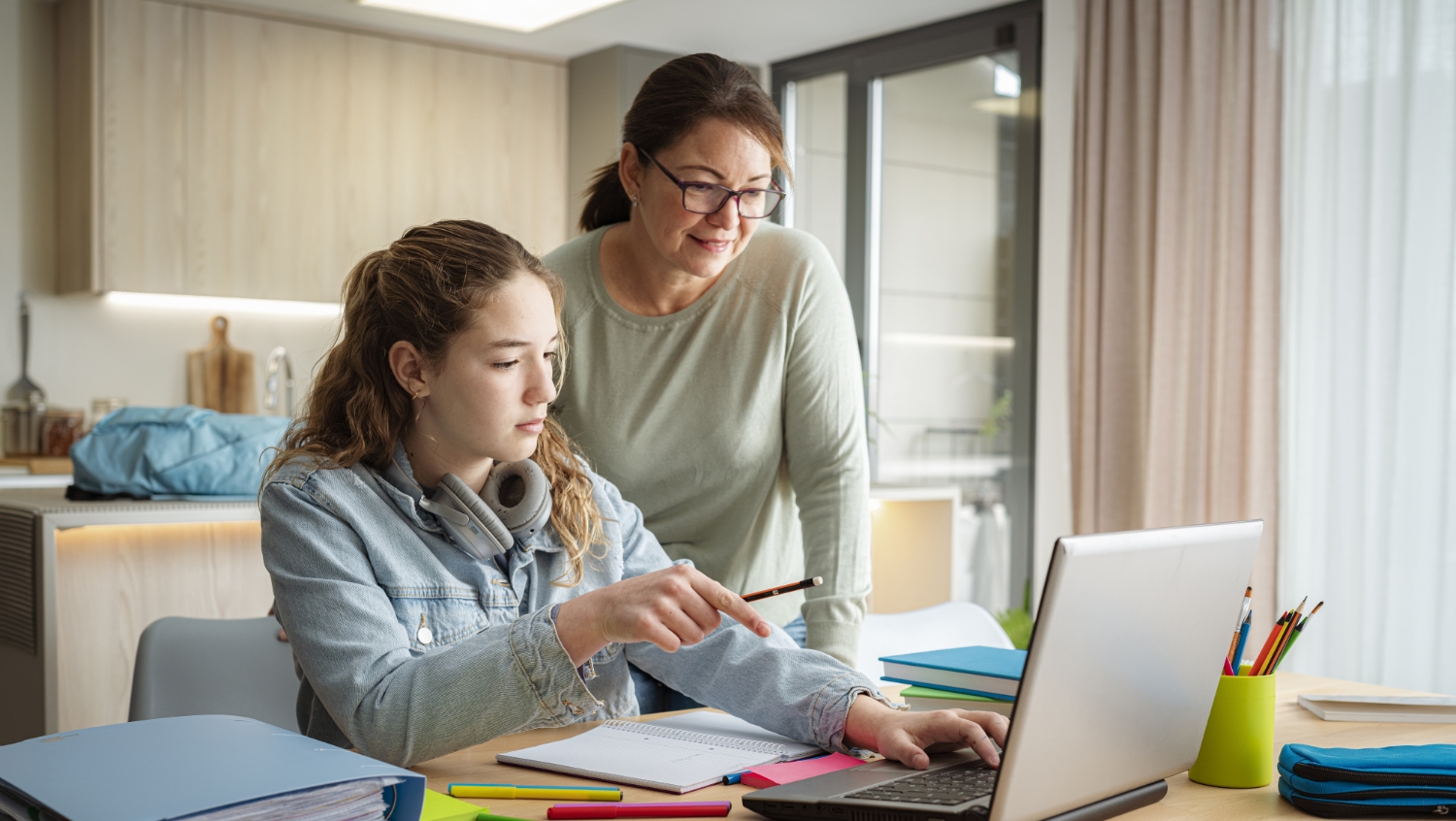Getting behaviour management right: Tops tips from the UK’s leading online alternative provision

Ask any teacher what makes the biggest difference to learning, and they will likely mention behaviour. A positive learning environment is one where pupils feel safe, understood, and ready to engage but achieving that balance takes more than rules alone.
At Academy21, we know that effective behaviour management is about connection. Every pupil is different, and situations can change quickly, so our approach is built on responsiveness, empathy, and flexibility. Clear boundaries still matter, but they work best when paired with strong relationships and a deep understanding of each young person’s needs.
Our teachers, leaders, and mentors are trained in trauma-informed and relational practices. They know how to recognise distress, respond calmly, and build trust over time. Our digital tools, small class sizes, and real-time monitoring all help facilitate meaning connections, adaptive approaches, and encouragement to participate and boost confidence and motivation.
Thanks to our rigorous and wide-ranging practices, we can proudly say that, at Academy21, we achieve some of the best behaviour among alternative provisions in the country.
Drawing on over a decade of experience supporting students who may be vulnerable or face challenging circumstances, this post explores the strategies we use every day and offers practical tactics schools can adopt in their own settings.
What is behaviour management?
Behaviour management refers to the systems and strategies teachers and schools use to encourage positive behaviour and minimise disruption. Its goal is to create a safe and productive environment for learning.
Traditionally, behaviour management has focused on setting rules, outlining consequences, and maintaining consistency. These aspects are still crucial: pupils need to know where the boundaries are, and teachers need systems to ensure classrooms remain orderly. However, it’s essential to recognise that some pupils, particularly students with SEND, may require reasonable adjustments to support their engagement and participation.
According to SENDMattersUK, some of these adjustments include:
- Organising pre-entry and individual check-ins: Some students may struggle to enter the classroom quietly and without verbal interaction. In these cases, teachers can meet with them before class to discuss expectations and provide reassurance. They can also check in with them individually once the class is settled.
- Scaffolding dependent work: Starting work independently can be difficult for some pupils, especially if they have ADHD or other condition that affects learning. To support them, teachers can provide single-step instructions clearly displayed on the board, ensure tasks increase in difficulty gradually, and offer prompts such as knowledge organisers to assist when they get stuck.
- Verbal responses: Sharing answers in full spoken sentences may be challenging for certain pupils. Adjustments might involve allowing them to rehearse their answer with a partner, write it down first, or see/hear a model answer before responding.
Why rules and routines are important
Clear rules and consistent routines form the bedrock of effective behaviour management. They provide stability, reduce uncertainty, and help lessons flow without unnecessary disruption. Most importantly, they give pupils clarity on what is expected of them from the very start of a lesson. The report from the Education Endowment Foundation highlights the below six recommendations to bolster behaviour in schools:
- Developing good relationships with pupils
- Promoting positive conduct and responding when students make errors
- Using targeted approaches to meet individual needs
- Applying classroom management strategies consistently
- Creating consistency and coherence at a whole-school level
- Monitoring and supporting pupils with intensive needs

Routines can cover almost every aspect of school life. For example, teachers may establish a clear process for how pupils:
- enter and settle in at the start of class,
- transition between group and independent work,
- collect or return resources such as books and laptops,
- signal when they need help without interrupting the lesson,
- or prepare for the end of class and dismissal.
These simple but reliable structures save valuable teaching time, make space to meet individual need, minimise opportunities for conflict, and allow teachers and pupils alike to focus on learning.
Boundaries also play a vital role in creating fairness. Clear expectations give pupils a sense of safety and understanding, but fairness doesn’t always mean treating everyone in exactly the same way.
For pupils with additional needs, consistency of care should go hand in hand with flexibility of approach. While consequences remain an important part of any behaviour framework, how and when they are delivered should depend on each pupil’s circumstances and level of regulation at the time.
Research backs this up. The Improving Behaviour in Schools report from Education Endowment Foundation (EEF) highlights that predictable environments, built through clear routines, reduce low-level disruption and increase learning time.
That said, rules and routines on their own do not guarantee real engagement. A pupil may comply outwardly while still feeling disconnected or confused. To build lasting positive behaviour, structure must be paired with relational approaches: strategies that make boundaries meaningful through respect, empathy, and trust.
The second piece of the puzzle: Relationships
Relational behaviour management recognises that pupils are not just part of a system. They are individuals, each with their own needs, motivations, and challenges. Embedded within an inclusion by design approach, it ensures that routines, expectations, and supports are planned to meet the needs of every pupil.
While routines create consistency, relationships build connection. When both are present, behaviour management becomes not just about compliance, but about genuine engagement.
This supportive environment also helps pupils develop the behaviours for learning that underpin lasting success. The EEF categorises these as:
- Emotional: The pupil can name emotions and express them accurately, manage impulses and show pride in successes
- Social: The pupil can focus on learning in class, is attentive to directions and actively listens to the teachers and classmates
- Cognitive: The pupil is able to organise time and space for own learning, set and track their own goals, and value other opinions
A pupil is far more likely to accept correction or respond positively to guidance from a teacher who shows respect, listens, and provides support. This doesn’t mean lowering expectations or avoiding boundaries. On the contrary, relational approaches make boundaries stronger by showing pupils that rules are there to support them, not control them.

Consider the difference: a rule about putting away mobile phones can feel restrictive if imposed coldly, but when a teacher explains it in terms of minimising distraction so everyone can succeed, the same rule becomes part of a shared culture of respect.
Strong relationships also prevent escalation. A calm word at the right moment, a discreet message to help a pupil refocus, or the chance to step away and reset can resolve issues before they turn into disruptions. Over time, this consistency of care builds trust and resilience, helping pupils take ownership of their behaviour and feel secure in the classroom environment.
Academy21’s relational behaviour strategies
At Academy21, we understand that behaviour management is most effective when it is responsive, relational, and adaptable. Every pupil is different, and situations can change quickly, so our teachers and mentors are trained in relational practice to respond with empathy, consistency, and flexibility.
Here are a few examples of how we put this into practice, and why we are able to achieve such positive and lasting changes in pupil behaviour:
1. Private chats pods
During our live, adaptive lessons, students have the option to communicate with teachers and peers via private and public chat pods. This flexibility allows students to choose how they engage, depending on their comfort and needs on any given day. It also allows teachers to use private chat to communicate with students directly and address issues quickly and discreetly. This avoids drawing class attention to mistakes or disruptions, which can cause embarrassment or defiance.
Delivered calmly and directly, a private message gives pupils the chance to adjust without feeling singled out. This technique reflects our belief that behaviour management should support, not shame.
2. Breakout spaces
At Academy21, breakout spaces are a versatile tool used to support both learning and behaviour management. Sometimes, pupils need more focused attention or a quieter environment to re-engage, and breakout rooms allow teachers to provide this effectively.
During an online lesson, a teacher can move pupils into a breakout room temporarily. This may be used to work with smaller groups, to offer targeted support, or to unpick conduct in a calm and supportive conversation. The aim is not to be punitive, but to maintain a positive learning environment and help pupils regulate and refocus.
Breakout spaces also give pupils the chance to engage in tasks independently or work more closely with a mentor if needed. By providing this flexibility, we reduce disruption, prevent small issues from escalating, and allow pupils to develop skills in self-regulation and reflection.
3. Close partnerships with mentors
At Academy21, we take behaviour management seriously, and a key part of our approach is maintaining close partnerships with the pupil’s school. Each pupil’s school that places students with us provides a mentor who stays in regular contact with us, helping ensure that our strategies are effective, targeted, and aligned with the pupil’s wider educational context.
Through our secure mentor portal, schools can access real-time information on attendance, engagement, and progress. This allows Academy21 to adapt strategies quickly if a pupil’s behaviour changes, while keeping the school fully informed.
Our approach is driven by care: we want to make sure that every intervention is genuinely helpful and tailored to the pupil’s needs. By combining consistent, relational strategies with close communication with the pupil’s school, we provide responsive support that helps pupils reflect, reset, and re-engage in learning.
Why Academy21 excels in behaviour management
Academy21 is proud to achieve some of the best behaviour in alternative provision in the country. This is no accident – it reflects the skill, expertise, and dedication of our teachers and leaders, who specialise in supporting students with challenging behaviours and complex needs.
Our staff adapt quickly and thoughtfully, responding to each pupil’s unique circumstances. Through ongoing evaluation and reflective practice, we continually refine our approaches, ensuring that interventions are personalised, effective, and sustainable.
We complement this expertise with strong partnerships with pupils’ schools. Using our secure mentor portal, schools have real-time insight into attendance, engagement, and progress, allowing us to adjust strategies swiftly while keeping schools fully informed. This close collaboration ensures consistency and targeted support across the pupil’s educational experience.
It’s this combination of highly skilled staff, deep internal expertise, adaptability, and school partnerships that allows Academy21 to deliver outstanding results. Pupils develop self-regulation, resilience, and positive behaviour that lasts – setting them up for success both in and beyond the classroom.



